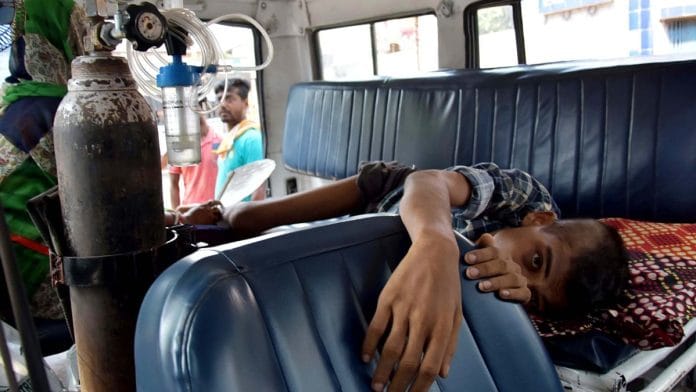New Delhi: Indians afflicted with certain cancers travel nearly 1,475 km and non-medical expenditures related to cancer treatment are dramatically higher than medical costs, according to a new analysis.
Published in the Journal of Cancer Policy this month, the research shows that the mean non-medical health expenditure (NMHE) for cancer patients undergoing treatment in public hospitals was Rs 88,433 and more than 75 percent of them travelled over 500 km to access treatment.
The findings are based on a prospective, non-interventional assessment of prospective, gastric and pancreatic cancer patients undergoing treatment at Tata Memorial Centre in Mumbai and are the first concrete evidence on the distances that cancer patients travel and the associated non-medical expenses.
The assessment by researchers from the International Institute for Population Sciences (IIPS) and Tata Memorial Centre also show that 83.2 percent of patients experienced Catastrophic Non-Medical Health Expenditure (CNMHE), i.e., when the cost incurred on treatment-related expenditure exceeds 10 percent of the family’s annual income.
The mean NMHE for patients traveling more than 1,500 km was Rs 107,040, nearly twice the expenditure of those traveling less than 500 km, and while gastric patents on average travelled 1,697 km and for pancreatic cancer patients, the average distance was 1,241 km.
“A structured decentralisation of cancer care is the need of the hour to negate the additional financial burden and CNMHE experienced by the cancer patients and their families,” the researchers noted.
If adequate infrastructure is provided in non-urban areas, they said, well-trained oncologists can be deployed in hospitals closer to patients for treatment at an earlier stage.
Lead researcher Mohan Pandey, a senior research fellow with IIPS, told ThePrint that the findings highlight the role of geography in creating inequities in cancer care access.
“The study also raises important questions: patients and caregivers who travel long distances may be forced to stay near hospitals, leading to significant time loss and productivity costs,” he said.
As a large proportion of patients receiving care in public or non-chargeable wards belong to economically weaker sections, this raises concerns about living conditions near hospitals and the potential adverse impact on treatment adherence and recovery, he said.
With over 14 lakh new cases being detected annually, India ranks second in Asia and third in the world in terms of the number of cancer cases, and the likelihood of developing cancer during lifetime for an Indian is approximately 11 percent.
The World Health Organisation’s global cancer observatory estimates that the incidence of cancer in India will increase to approximately 26.6 lakh cases by 2045.
The most common cancers are oral, lung, and prostate in Indian males and breast, cervical, and ovarian in females. Gastric malignancies including those of stomach, colorectal and oesophagus are also common in India. Pancreatic cancer, though fewer in numbers, is known to be among the most aggressive forms of malignancies.
Also Read: Cancer striking and claiming more lives among Indian women than men, shows ICMR study
Huge scarcity beyond metros
The key findings show that distress health financing due to treatment—when families had to sell assets or borrow—was 39.3 percent but it shot up to 52.8 percent and was two times higher in patients travelling over 500 km compared to under the 500 km category.
Also, 42.9 percent of NMHE was spent on travel costs, 33.3 percent on accommodation, and 17.2 percent on food expenses.
The study underlines that cancer care faces significant challenges, primarily due to the uneven distribution of healthcare facilities across the country. While urban areas have a higher concentration of specialised hospitals, rural regions suffer from a stark deficit of such essential services.
This disparity, it said, not only exacerbates the burden on urban hospitals but also leaves a large segment of the population with limited access to timely and effective treatment.
According to previous studies, the majority of medical infrastructure and specialists are concentrated in metropolitan cities, creating a pronounced urban-rural divide in cancer care accessibility
Only 454 hospitals, primarily located in the metro cities, have been licensed for cancer treatment by the Atomic Energy Regulation Board (which regulates the use of radiation in cancer care by ensuring safety standards). “These figures indicate the scarcity of cancer treatment facilities and trained doctors in cancer care,” the research says.
Pandey said that findings indicate an urgent need for financial protection mechanisms beyond medical costs.
“Decentralising cancer care by establishing diagnostic and treatment facilities in semi-urban and rural areas is vital to minimising long-distance travel. Targeted interventions, such as subsidised transportation, low-cost accommodation near tertiary hospitals, and caregiver support programmes, can further reduce inequities in treatment access,” he pointed out.
An app could be developed to provide patients and families with critical information such as the nearest hospitals, the services they offer, treatment costs, estimated distance from the patient’s location, available accommodation, and concessions in travel, Pandey suggested.
Such a platform could even integrate ticket booking for trains and flights, easing the logistical and financial challenges, according to the lead researcher.
(Edited by Tony Rai)
Also Read: International expertise is next frontier in cancer care for Indians. Pvt hospitals joining bandwagon






